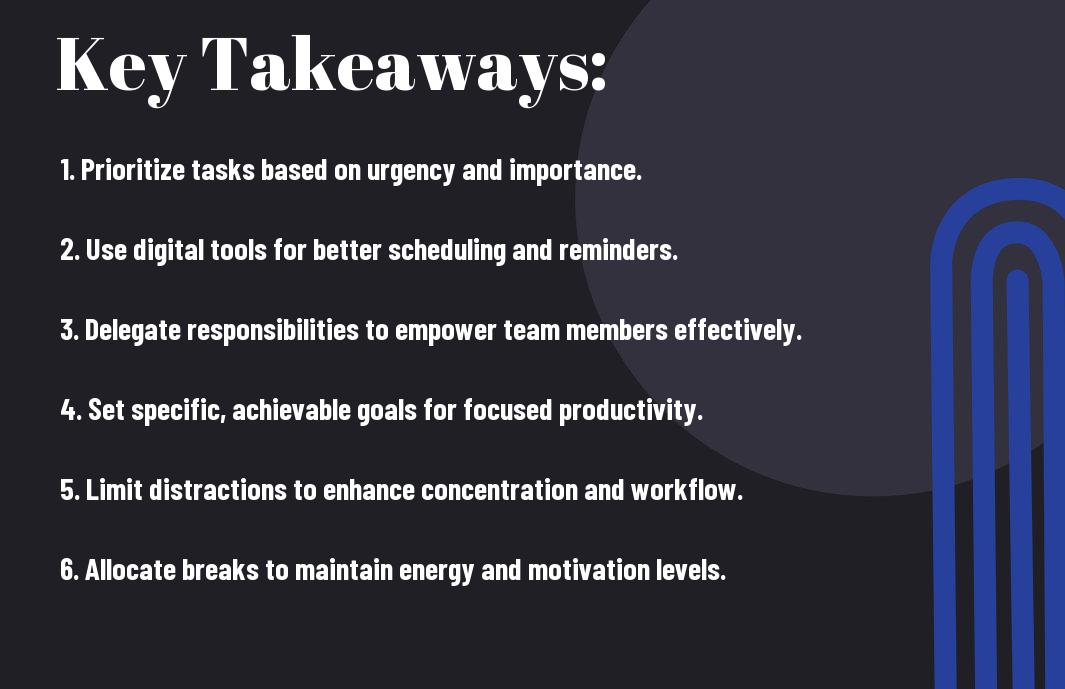
You face numerous responsibilities as a business owner, and mastering your time is key to achieving your goals. Effective time management not only helps you maximize productivity but also allows you to balance work and personal life. In this blog post, you will discover practical tips to streamline your daily operations, set priorities, and make the most of your valuable hours, ensuring your business thrives as you work efficiently and strategically.

Understanding Time Management
To effectively navigate the complexities of business ownership, you need to grasp the concept of time management. This involves planning and exercising conscious control over the amount of time spent on specific activities, allowing you to prioritize tasks and increase productivity. By improving your time management skills, you can enhance your decision-making processes, create more structure in your projects, and maintain a healthier work-life balance.
The Importance of Time Management
The significance of time management in your business cannot be overstated. Efficiently managing your time allows you to focus on what truly matters, enabling you to meet crucial deadlines, reduce stress, and enhance overall efficiency. When you prioritize tasks effectively, you not only boost your performance but also cultivate a more organized approach to achieving your business goals.
Common Time Management Challenges
Management of time can often be fraught with challenges. You may find yourself juggling multiple responsibilities, procrastinating, or struggling to determine which tasks deserve your attention. These challenges can impede your productivity and hinder your ability to achieve your objectives effectively.
Understanding the common time management challenges you face is vital for your improvement. Overwhelm can stem from taking on too many projects or failing to set clear priorities. Additionally, distractions, such as digital devices or an unorganized workspace, can lead to wasted time. By addressing these issues, you can develop strategies that focus on your tasks without getting sidetracked, ensuring that your work aligns with your goals and aspirations.
Setting Priorities
Now, crafting a list of priorities is necessary for maximizing your productivity as a business owner. Start by understanding what tasks align with your broader business goals. Focus on what will drive value and help you achieve desired results. By establishing clear priorities, you can allocate your time and resources more effectively, reducing stress and enhancing focus on what truly matters.
Identifying Key Tasks
Around your goals, it’s vital to identify key tasks that contribute to your success. Break down projects into actionable steps and assess each task’s impact on your objectives. This process will help you distinguish between what’s urgent and what’s important, ensuring that you are directing your energy where it matters most.
The Eisenhower Matrix
Priorities become clearer when you implement the Eisenhower Matrix, a decision-making tool that helps you categorize tasks based on urgency and importance. This framework guides you in identifying activities that require immediate attention versus those that can be scheduled for later, delegated, or eliminated entirely, thus optimizing your time management strategy.
Tasks are organized within the Eisenhower Matrix into four quadrants: urgent and important, important but not urgent, urgent but not important, and neither urgent nor important. By categorizing your tasks, you can easily focus on what needs immediate action while planning for long-term projects without losing sight of daily responsibilities. This method not only enhances your productivity but also enables you to delegate or discard less impactful tasks, thus streamlining your workflow.
Planning and Scheduling
Keep in mind that effective planning and scheduling are foundational to successful time management. By organizing your tasks and prioritizing them accordingly, you can navigate your responsibilities more efficiently. Start each week with a clear agenda that breaks down your goals into manageable daily tasks, allowing you to stay focused and productive throughout the week.
Daily vs. Weekly Planning
At the beginning of each week, take time to evaluate your objectives and outline your priorities. A weekly plan gives you the big picture, while daily planning helps you concentrate on immediate tasks. By balancing both approaches, you’ll create a rhythm that maximizes your productivity and keeps your long-term goals in sight.
Utilizing Digital Tools
After defining your plans, leverage digital tools to streamline your scheduling process. Applications like calendars and project management software can help you stay organized and focused on your tasks, ensuring you allocate time effectively and meet your deadlines.
But don’t just choose any tool—select one that fits your work style. Explore apps that offer reminders, task lists, and collaboration features to enhance your productivity. By integrating technology into your planning, you can automate repetitive tasks, track your progress, and adjust your schedule as needed, making it easier to stay on top of your commitments and ultimately achieve your business goals.
Delegating Effectively
Once again, effective delegation can significantly enhance your productivity as a business owner. By assigning tasks to capable team members, you free up time to focus on strategic initiatives, while empowering your staff to grow their skills. The key to successful delegation lies in identifying the right tasks and entrusting them to individuals whose strengths align with those responsibilities. This not only lightens your workload but also fosters a more dynamic and engaged workplace.
Knowing When to Delegate
Between the demands of daily operations and long-term goals, understanding the right moments to delegate is vital. Assess your workload regularly and identify tasks that consume excessive time or fall outside your area of expertise. By strategically choosing what to delegate, you can ensure that you are allocating your time toward high-impact activities that drive your business forward.
Building a Trustworthy Team
Against the common misconception that delegation means losing control, establishing a reliable team fosters accountability and trust. By selecting individuals who demonstrate competence and commitment, you can confidently delegate key tasks. This process encourages open communication, transparency, and mutual respect, which are vital components of a successful working relationship.
Understanding the importance of trust in your team allows you to delegate with confidence. Spend time developing relationships where feedback is welcomed and collaboration thrives. Regularly acknowledge your team members’ contributions, creating a supportive atmosphere where they feel valued. By cultivating trust, you empower your team, leading to higher overall performance, innovation, and job satisfaction, ultimately benefiting your business as a whole.
Avoiding Procrastination
Many business owners struggle with procrastination, which can hinder productivity and lead to missed opportunities. Recognizing the habits that cause delays in your workflow is the first step towards overcoming this challenge. By implementing effective strategies, you can boost your efficiency and maintain focus on important tasks, ensuring that your business thrives without unnecessary setbacks.
Techniques to Overcome Procrastination
Along with identifying the triggers that cause procrastination, adopting specific techniques can help you take action. Breaking tasks into smaller, manageable parts can make them feel less overwhelming. Employing the Pomodoro Technique, where you focus for a set time followed by short breaks, can also enhance your concentration and diminish distractions. Additionally, visualizing your accomplishments can motivate you to get started.
Setting Realistic Deadlines
Around every project, realistic deadlines provide a framework to prioritize your tasks effectively. When you allot sufficient time for each assignment, you not only reduce stress but also improve the quality of your work. This strategy allows you to allocate resources wisely and ensures that you remain focused on your goals without compromising on quality.
Overcome the tendency to underestimate the time required for tasks by evaluating past projects and considering potential challenges you might face. By setting deadlines that reflect a balance between urgency and feasibility, you can create a plan that encourages consistent progress. Regularly review and adjust these deadlines as needed to keep pace with your workload and enhance your overall productivity.
Maintaining Work-Life Balance
Your ability to maintain a healthy work-life balance can significantly influence your overall happiness and productivity as a business owner. It’s vital to carve out time for personal pursuits and relaxation, which can recharge your mind and ultimately enhance your work performance. Prioritizing work-life balance allows you to manage stress better and fosters a more fulfilling life, both personally and professionally.
The Impact on Productivity
Against common belief, working longer hours doesn’t equate to higher productivity. In fact, neglecting your personal well-being can lead to burnout, which diminishes your effectiveness in the long run. When you prioritize balance, you’re more likely to approach your tasks with renewed energy and focus, leading to improved outcomes.
Strategies for Balance
About maintaining work-life balance, consider adopting specific strategies that work for you. This can include setting clear boundaries between work and personal time, scheduling regular breaks, and allocating time for activities that bring you joy. These practices will not only improve your well-being but also enhance your business’s productivity.
The implementation of strategies for balancing work and life begins with recognizing your limits. Establishing a daily routine that prioritizes both professional responsibilities and personal time allows you to stay focused while ensuring you have time for relaxation. Explore options like delegating tasks, using productivity tools, and setting specific work hours to help create the separation you need. Engage in hobbies, family time, or physical exercise to promote your mental and emotional health, leading to a more productive and satisfying work life.
Final Words
Following this guide on effective time management tips for business owners can significantly enhance your productivity and decision-making processes. By prioritizing tasks, setting specific goals, and leveraging tools that aid in organization, you can gain better control of your time. Embrace delegation and streamline your workflows to focus on what truly matters for your business growth. Implementing these strategies will not only help you manage your time more effectively but also empower you to achieve your business objectives with greater efficiency.
Leave a Reply